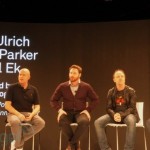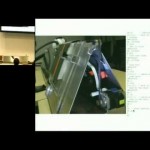![]() The Electronic Frontier Foundation recaps two court cases pending in the U.S. which will decide whether you’re allowed to re-sell the things you purchase. The first case deals with items bought in other countries for resale in the U.S., such as textbooks. An unfavorable decision there would mean “anything that is made in a foreign country and contains copies of copyrighted material – from the textbooks at issue in the Kirtsaeng case to shampoo bottles with copyrighted labels – could be blocked from resale, lending, or gifting without the permission of the copyright owner. That would create a nightmare for consumers and businesses, upending used goods markets and undermining what it really means to ‘buy’ and ‘own’ physical goods. The ruling also creates a perverse incentive for U.S. businesses to move their manufacturing operations abroad. It is difficult for us to imagine this is the outcome Congress intended.” The second case is about whether music purchased on services like iTunes can be resold to other people. “Not only does big content deny that first sale doctrine applies to digital goods, but they are also trying to undermine the first sale rights we do have by forcing users to license items they would rather buy. The copyright industry wants you to “license” all your music, your movies, your games — and lose your rights to sell them or modify them as you see fit.” Read more of this story at Slashdot.
The Electronic Frontier Foundation recaps two court cases pending in the U.S. which will decide whether you’re allowed to re-sell the things you purchase. The first case deals with items bought in other countries for resale in the U.S., such as textbooks. An unfavorable decision there would mean “anything that is made in a foreign country and contains copies of copyrighted material – from the textbooks at issue in the Kirtsaeng case to shampoo bottles with copyrighted labels – could be blocked from resale, lending, or gifting without the permission of the copyright owner. That would create a nightmare for consumers and businesses, upending used goods markets and undermining what it really means to ‘buy’ and ‘own’ physical goods. The ruling also creates a perverse incentive for U.S. businesses to move their manufacturing operations abroad. It is difficult for us to imagine this is the outcome Congress intended.” The second case is about whether music purchased on services like iTunes can be resold to other people. “Not only does big content deny that first sale doctrine applies to digital goods, but they are also trying to undermine the first sale rights we do have by forcing users to license items they would rather buy. The copyright industry wants you to “license” all your music, your movies, your games — and lose your rights to sell them or modify them as you see fit.” Read more of this story at Slashdot.
Read More:
Defending the First Sale Doctrine







